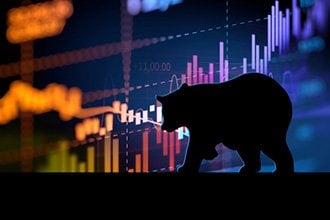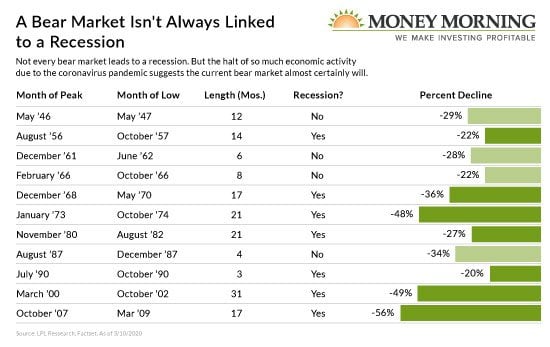 In the wake of the stock market's historic nosedive, financial terms like "bear market" and "recession" have replaced "bull market" and "boom."
In the wake of the stock market's historic nosedive, financial terms like "bear market" and "recession" have replaced "bull market" and "boom."
It's been a while since we've had to use those terms - the last bear market bottomed out March 9, 2009, a long 11 years ago - so some investors may be rusty on what they mean and how they relate to each other.
All of this was sparked, of course, by the coronavirus pandemic. As millions of people started practicing self-isolation, many types of economic activity have come to an almost complete halt.
When the implications of a U.S. economy in lockdown became clear, we had a stock market crash.
Now, we're in the middle of a bear market and an almost-certain recession. But while related, they're not the same thing...
The Link Between a Bear Market and a Recession
To understand the connection between these terms, we first need to define them:
- A bear market is a decline of 20% or more from a recent high in a broad market index such as the Dow Jones Industrial Average, and is usually accompanied by negative investor sentiment. A bear market is worse than a correction, which is defined as a 10% pullback from a recent market high.
- A recession describes the state of the economy rather than the stock market. It's defined as two or more consecutive quarters of negative growth in the gross domestic product (GDP).
That said, it appears unavoidable that the coronavirus bear market will be linked to a recession this time around. Travel has slowed to a trickle. Restaurants are closed. Movie theaters are closed. Retailers that don't sell "essential" goods such as food and household supplies are shuttered. The pandemic has been like sand poured into the U.S. economic engine.Bear markets and recessions often occur together, but it's by no means a rule. According to CNBC, four out of the 11 bear markets since the end of World War II had no corresponding recession.

Goldman Sachs says that the U.S. economy likely shrank 6% in the first quarter (which ended March 31) and will shrink a stunning 24% in the second quarter.
The St. Louis Federal Reserve has estimated 47 million jobs could be lost. That would push the unemployment rate to 32% - seven percentage points higher than its peak at the height of the Great Depression.
Mislav Matejka, head of global equity strategy at JPMorgan, notes that the combination of layoffs, furloughs, and closings is devastating consumer spending - 70% of the U.S. economy. Matejka sees the impact lingering into the latter half the year - in other words, no V-shaped recovery.
"While consensus view still appears to be a quick recovery, recessions tend to linger," Matejka said in a research note. "It took equities on average 18 months to record the final low in the past."
There's also the wild card of an attempt to return to normal too soon that would trigger a "second wave" of coronavirus cases.
Despite some optimism on Wall Street over the past week, a cold-eyed look at what the economy is facing suggests the current bear market isn't over - and could easily dip below the March 23 lows.
At some point, when we have a vaccine and confirmed, FDA-approved treatments for COVID-19, the economy (and stocks) will rebound. But we just don't know when that will happen.
In the meantime, we have some ideas for investors trying to cope with this bear market...
How to Survive the Coronavirus Bear Market
[mmpazkzone name="in-story" network="9794" site="307044" id="137008" type="4"]
One thing we've seen a lot of during this downturn is volatility. It's a hallmark of bear markets, so we're likely to see more of it.
Money Morning Technical Trading Specialist D.R. Barton, Jr., foresees "a volatile and uncertain stretch" ahead. But he says traders can take advantage of this market if they follow a few guidelines.
"First, your trades have to be short-term," he said. "And you have to be agile and adapt to what the market gives you. Finally, you have to be in and out - then repeat that pattern over and over."
Barton also had advice for long-term investors.
He suggested looking for stocks with strong fundamentals - well-established companies with solid balance sheets and reasonable expectations for growth when things return to something close to normal.
But in a bear market you have to take smaller bites, he said. It's something called the "Accumulate" strategy.
"If your goal is the creation of meaningful wealth - and if your time frame is a long one - then I think you're fine to buy in small blocks whenever you have the chance," he said.
This strategy allows you to buy at different price points as a share prices drop. When the rebound comes, you'll be well positioned to reap gains.
For those comfortable with options, this market presents still more opportunities...
Learn How to Harness This Powerful Options Trading Secret for Yourself
Live from his private office in Florida, America's No. 1 Pattern Trader is revealing his most lucrative options trading secret yet.
It's the reason he's able to make such fast, profitable moves on companies like Netflix, Apple, Facebook, even Amazon - the reason he's able to see major paydays long before they happen.
We're talking about the potential to see the future of any stock on the market.
And Tom Gentile's going live to show you exactly how to do it.
Believe it or not, it's as easy as a few simple clicks of your mouse...
In no time at all, you could be lining up trade opportunities one by one and watching as your account grows bigger and bigger.
Follow me on Twitter @DavidGZeiler and Money Morning on Twitter and Facebook.
About the Author
David Zeiler, Associate Editor for Money Morning at Money Map Press, has been a journalist for more than 35 years, including 18 spent at The Baltimore Sun. He has worked as a writer, editor, and page designer at different times in his career. He's interviewed a number of well-known personalities - ranging from punk rock icon Joey Ramone to Apple Inc. co-founder Steve Wozniak.
Over the course of his journalistic career, Dave has covered many diverse subjects. Since arriving at Money Morning in 2011, he has focused primarily on technology. He's an expert on both Apple and cryptocurrencies. He started writing about Apple for The Sun in the mid-1990s, and had an Apple blog on The Sun's web site from 2007-2009. Dave's been writing about Bitcoin since 2011 - long before most people had even heard of it. He even mined it for a short time.
Dave has a BA in English and Mass Communications from Loyola University Maryland.



